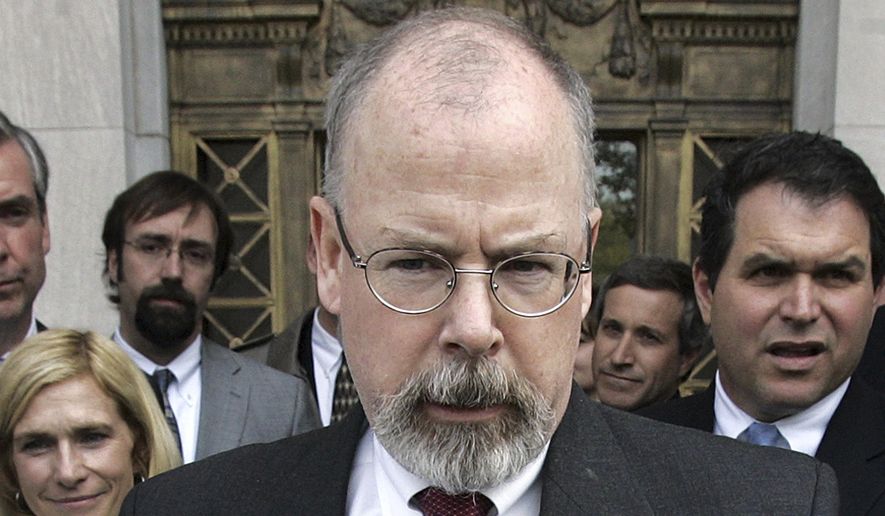A Justice Department prosecutor hinted to a federal judge Wednesday that special counsel John Durham has not ruled out criminal charges against tech executive Rodney Joffe.
“We have not at this point charged [Mr. Joffe] with a crime, but as we’ve been saying all along, this is an ongoing investigation and we can’t say no crime has been committed,” Andrew DeFilippis, a prosecutor, said in a Washington courtroom.
Mr. DeFilippis didn’t provide more information, saying he was hesitant to talk about ongoing investigative steps in Mr. Durham’s probe.
He did say that Mr. Joffe had a government contract in 2016, and the statute of limitations for government abuse misconduct charges extends beyond five years. However, it is not clear if the special counsel is looking into those charges.
But a defense lawyer in the case, Sean Berkowitz, said the prosecutor is trying to pressure Mr. Joffe against providing testimony that could help his client, former Clinton campaign attorney Michael Sussmann.
“Telling a witness they continue to face criminal liability is federal government overreach,” Mr. Berkowitz told the court, adding that he’s seen no evidence that Mr. Joffe did anything wrong.
Steven Tyrrell, an attorney who is representing Mr. Joffe in the case, was not in the courtroom and did not respond to requests for comment from The Washington Times.
The special counsel, who was appointed in 2019, is investigating the early stages of the FBI’s probe into alleged links between former President Trump and Russia.
The possibility of charges against Mr. Joffe arose during an evidentiary hearing in the case against Mr. Sussmann. He was indicted last year on charges that he lied to the FBI about his clients — Hillary Clinton’s 2016 campaign and Mr. Joffe — when he pushed now-debunked claims of covert communications between the Trump Organization and Russia’s Alfa Bank.
Mr. Joffe was expected to testify on behalf of Mr. Sussmann during his trial next month, but has now decided to invoke his Fifth Amendment right against self-incrimination, angering Mr. Sussmann’s defense attorneys.
Mr. Berkowitz accused the special counsel’s office of bullying Mr. Joffe with the threat of criminal charges to stop him from testifying. He said Mr. Joffe could offer exculpatory evidence, and asked U.S. District Judge Christopher Cooper to compel him to testify. He also argued that Mr. Durham should dismiss the charges against Mr. Sussmann if he won’t grant Mr. Joffe immunity.
Mr. Berkowitz emphasized that Mr. Joffe is a critical witness for his client. He said that the Durham probe has been going on for three years and investigators have likely made up their minds about whether or not to charge Mr. Joffe.
“The special counsel’s office has been looking into this for years and should have been able to make a decision about whether [Mr. Joffe] committed a crime. Not being able to make that decision, we believe, is a tactical decision,” he said. “Threats are not necessary.”
Judge Cooper said he’ll look into the matter and will issue a ruling on whether or not Mr. Joffe should testify in the Sussmann trial, which is scheduled to start on May 16.
In earlier court documents, Mr. Sussmann’s team has argued that their client and Mr. Joffe passed along the Alfa Bank allegations to help the government. They said Mr. Joffe held a “good faith belief” that what he and Mr. Sussmann shared with the FBI was accurate.
The Durham team has argued that Mr. Joffe, Mr. Sussmann and the Clinton campaign acted “in concert” to disseminate stories tying Mr. Trump to Russia, triggering negative news coverage about him during the 2016 presidential campaign.
In February, Mr. Durham said he has evidence that Mr. Joffe “exploited” domain name system internet traffic at Trump Tower, Mr. Trump’s Central Park West apartment building and the Executive Office of the President.
Mr. Durham has also alleged that Mr. Joffe tasked researchers with mining internet data to establish “an inference” and “narrative” linking Mr. Trump to Russia in order to curry favor with top Clinton campaign officials.
Judge Cooper also declined to issue a bench ruling on whether or not four emails Mr. Joffe shared with a U.S. investigative firm should be kept out of the hands of Mr. Durham during the Sussmann trial.
Mr. DeFilippis said the emails show some of the researchers Mr. Joffe tasked with mining Mr. Trump’s internet data to create a narrative tying the former president to Russia expressed doubts about the projects.
He said the fact that this information was withheld from the FBI is critical to the case.
“These emails tell a story about how [the Trump-Russia allegations] were assembled,” Mr. DeFilippis said.
Judge Cooper seemed skeptical, wondering why the government couldn’t just call the researchers to testify about their concerns. Mr. DeFilippis said the emails show a “back-and-forth” about the researchers’ concerns.
Mr. Berkowitz said the emails are not relevant to the case against Mr. Sussmann, who was not copied on any of the messages. He said no one at the FBI asked him about the researchers or who reviewed the Alfa Bank allegations.
“A simple question that could have been asked is ‘who were the cyber experts?’” he said.
• Jeff Mordock can be reached at jmordock@washingtontimes.com.




Please read our comment policy before commenting.